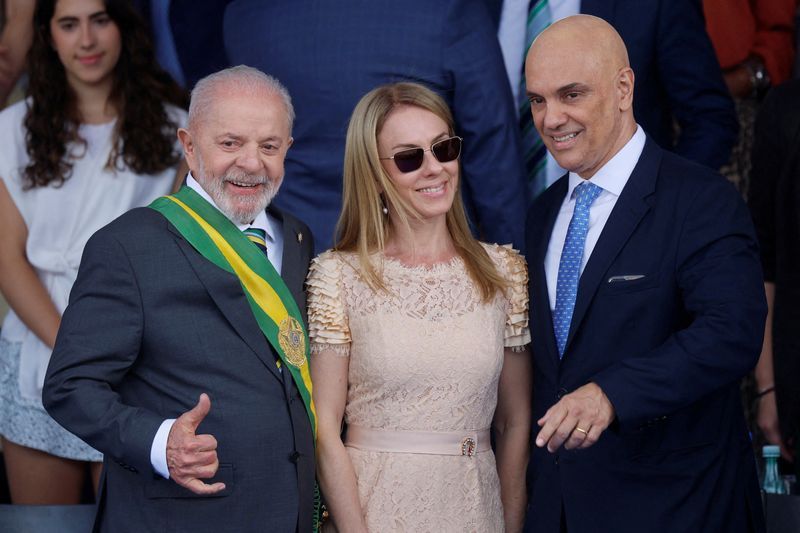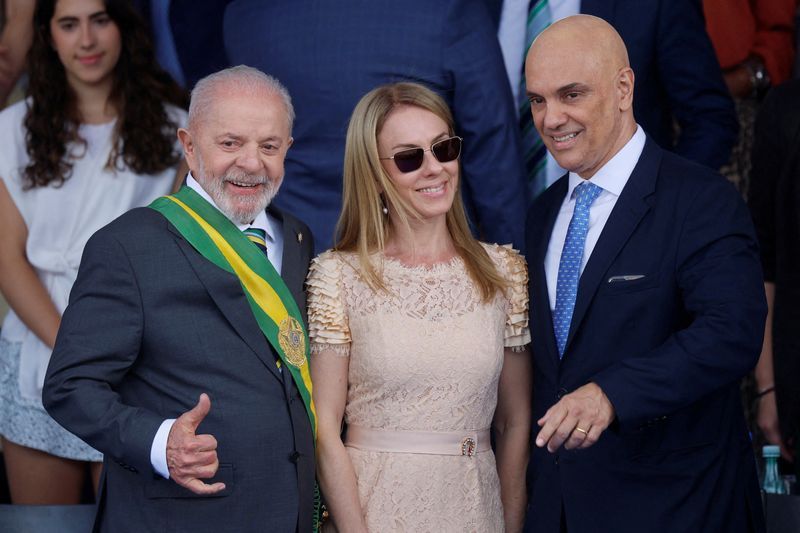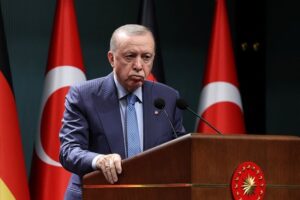
WASHINGTON (Reuters) -The U.S. on Monday imposed sanctions on the wife of the Brazilian judge who presided over the criminal case of right-wing former President Jair Bolsonaro, as a months-long showdown between the Trump administration and the Brazilian government deepens.
In an expansion of its sanctions targeting Brazil’s judiciary, the Trump administration imposed sanctions on Viviane Barci de Moraes, the wife of Supreme Court Justice Alexandre de Moraes, under authorities provided by the Global Magnitsky Act, the Treasury Department’s website showed.
It also imposed sanctions on the Lex Instituto de Estudos Juridicos, a financial entity controlled by Barci de Moraes and other family members that the U.S. government believes could serve as a vehicle to evade pre-existing sanctions, the notice showed.
Brazil’s Supreme Court declined to comment. Barci de Moraes’ law firm did not immediately respond to a request for comment.
Moraes presided over the criminal case of right-wing former President Jair Bolsonaro, who was convicted earlier in the month of attempting a self-coup to stay in power after he lost the 2022 election to current leftist President Luiz Inacio Lula da Silva. He was sentenced to 27 years in prison.
His lawyers have said they will appeal the conviction, though jurists say their chances of success are remote.
De Moraes himself was already hit in July with sanctions under the Global Magnitsky Act, which allows the U.S. to impose economic penalties against foreigners it considers to have a record of corruption or human rights abuses. A senior administration official said the new measures would help increase the efficacy of the sanctions announced in July.
Taken as a whole, the latest sanctions represent a deepening of an ongoing diplomatic crisis between the Western Hemisphere’s two largest democracies.
Trump and his political allies have long dismissed the criminal case against Bolsonaro as a political witch-hunt. The U.S. president, who was himself indicted criminally for trying to stay in power following his 2020 election loss to former President Joe Biden, has frequently indicated that he sees a kindred spirit in the former Brazilian leader.
De Moraes has stood firm on Brazil’s judicial independence after receiving U.S. sanctions.
“Respect comes from independence. A subservient, cowardly judiciary, one that makes deals just to calm the country down, is not independent,” he said in August.
Earlier in July, the Trump administration yanked U.S. visas held by Moraes and several other Brazilian Supreme Court justices. The U.S. also hit Brazil with a 50% tariff on most goods.
The new sanctions underline how Trump is relying more heavily on financial penalties to achieve political ends than his predecessors. In the past, Magnitsky Act sanctions have been reserved to individuals whose actions draw bipartisan scorn, like war criminals or individuals involved in assassinations.
WASHINGTON EYES AMNESTY FOR BOLSONARO, RIOTERS
In addition to serving as a U.S. response to Bolsonaro’s conviction, the new sanctions are meant to target what the U.S. alleges is a broad censorship regime in Brazil, spearheaded by Moraes and aimed at conservatives, including some legal U.S. residents.
The Brazilian government denies that any such censorship regime exists, and many Democrats and Western leaders see U.S. sanctions as an example of bullying directed at a nation that should be a major hemispheric ally.
Freedom of speech is a significantly more circumscribed right in Brazil than it is in the U.S., and various forms of racism or hate speech or comments seen as attacks on democratic institutions can be considered criminal offenses.
In recent years, Moraes and other judicial officials have ordered social media profiles to be removed via often secret orders and instigated probes into public figures, among other measures. That has led to high-profile feuds with major social media platforms, including Elon Musk’s X. At times, the nation’s major newspapers have expressed censorship concerns.
Moraes’ critics say such moves represent an erosion of due process. Moraes’ defenders say he is protecting Brazil’s democracy – which is only 40 years old after emerging from a military dictatorship – from extremely credible threats.
The Trump administration is closely watching an amnesty bill working its way through Brazil’s Congress, which could provide relief to Bolsonaro, his accomplices and pro-Bolsonaro demonstrators involved in a January 8, 2023, attack on government buildings in Brasilia, the senior administration official said.
Lawmakers voted by a large margin last week to fast-track a vote on that bill. But the text has not been defined, and it is unclear if a final package would shorten sentences or annul convictions outright. It is also unclear if the final bill will apply to the demonstrators, Bolsonaro or both.
The Trump administration strongly prefers full amnesty for all relevant actors, Bolsonaro included, the official said. Full amnesty is a precondition for lifting sanctions, the official added, assuming that the Brazilian Supreme Court does not stymie that effort.
Court officials have indicated that Congress does not have the constitutional power to pardon Bolsonaro for his crimes, meaning a future showdown in Brazil between the nation’s legislative and judicial branches is possible.
(Reporting by Gram Slattery; Editing by Aurora Ellis and Daniel Wallis)






